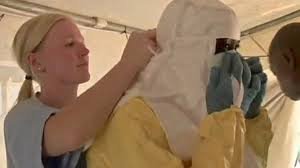Vaccine and treatment
Ebola Virus

Vaccine and treatment
No licensed vaccine for EVD is available. Several vaccines are being tested, but none are available for clinical use.Severely ill patients require intensive supportive care. Patients are frequently dehydrated and require oral rehydration with solutions containing electrolytes or intravenous fluids.No specific treatment is available. New drug therapies are being evaluated.
 Quarantine
Quarantine Ebola virus in animals
Ebola virus in animals Research
Research What is Ebola
What is Ebola History
History Reservoir
Reservoir Previous names
Previous names WHO response
WHO response Transmission from animals to humans
Transmission from animals to humans Diagnosis
Diagnosis Controlling infection in health care settings
Controlling infection in health care settings More ...
 Test your English Language
Test your English Language  Best Hotel Swimming Pools
Best Hotel Swimming Pools Most Beautiful Mosques In The World
Most Beautiful Mosques In The World Benefits of Garlic
Benefits of Garlic Latest New Cars
Latest New Cars Way To Wakeup
Way To Wakeup Most Amazing Fountains Around The World
Most Amazing Fountains Around The World Most Amazing Roads
Most Amazing Roads Most Amazing Streets in the World
Most Amazing Streets in the World




